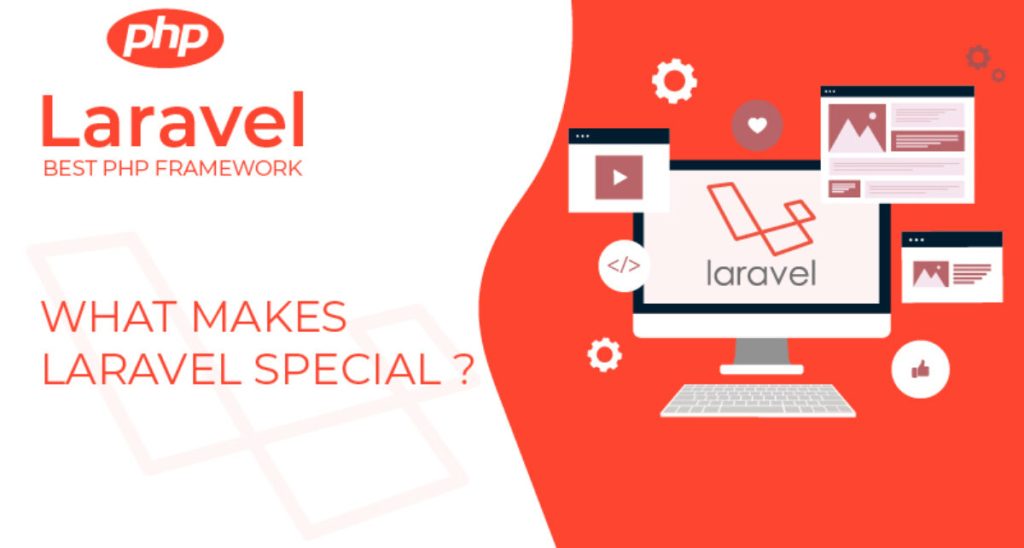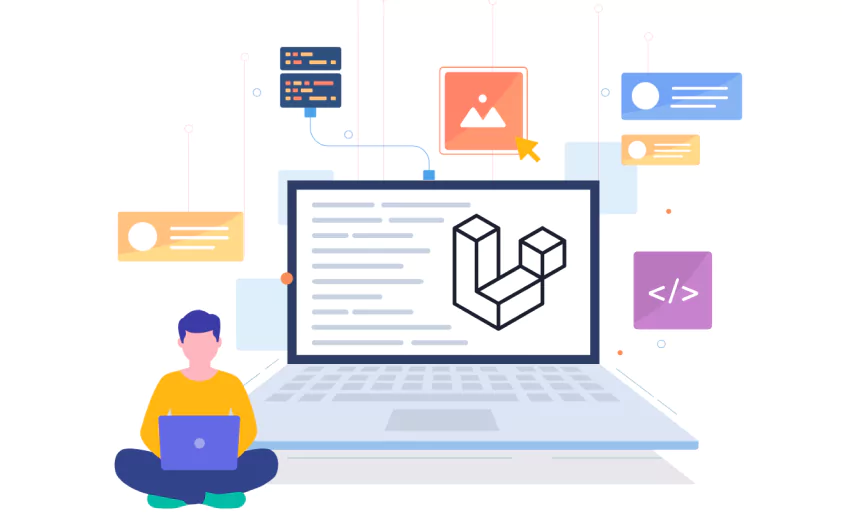Getting Started with Laravel PHP Framework for Web Development
Laravel PHP Framework is one of the most popular PHP frameworks, known for its elegant syntax and robust features that make web development more efficient and enjoyable. In this blog post, we’ll dive into what Laravel is, its core features, why it’s a preferred choice for developers, and some real-world use cases.
1. What is Laravel?
Laravel PHP Framework is an open-source PHP framework designed for building web applications following the Model-View-Controller (MVC) architecture. Released in 2011 by Taylor Otwell, Laravel was created to simplify complex tasks in web development, such as authentication, routing, sessions, and caching. It aims to make the development process faster while maintaining code quality.

Key characteristics of Laravel:
- MVC Architecture: Separates the application’s logic, presentation, and data, ensuring clean and maintainable code.
- Open-Source: Community-driven with regular updates and extensive documentation.
- Rich Ecosystem: Offers a variety of built-in tools and features that reduce the need for third-party packages.
2. The Technology Behind Laravel
Laravel PHP Framework is built on several technologies and principles that work together to create a modern development environment:
- PHP: Laravel is a PHP framework, meaning it leverages PHP’s server-side scripting capabilities to handle back-end functionality.
- Composer: A dependency management tool for PHP, Composer allows Laravel to manage packages and libraries, making it easy to integrate third-party components. You can learn more about Composer on Composer’s official website.
- Blade Templating Engine: Laravel’s built-in templating engine, Blade, simplifies the process of creating dynamic content while providing features like template inheritance and data binding.
- Eloquent ORM: The Object-Relational Mapping (ORM) system allows developers to interact with the database using a simple and intuitive syntax.
- Artisan Command-Line Tool: Laravel’s built-in command-line interface (CLI), Artisan, helps automate repetitive tasks and streamline development workflows.
3. Key Features of Laravel
Laravel PHP Framework offers a comprehensive set of features that cater to developers’ needs, making it an ideal choice for building web applications:
- Elegant Syntax: Laravel is known for its expressive, clean syntax that makes coding easier and more enjoyable.
- Built-in Authentication and Authorization: Simplifies user management with built-in features for user registration, login, and role-based access control.
- Routing: Laravel’s routing system allows developers to define web routes in a simple and organized way.
- Task Scheduling: Enables scheduling automated tasks using the built-in task scheduler.
- Queues and Background Jobs: Laravel’s queue system manages time-consuming tasks in the background, improving application performance.
- Comprehensive Testing Tools: Provides built-in support for unit testing, making it easier to write and maintain reliable code.
- RESTful Controllers: Supports creating RESTful APIs easily with resource controllers and API routes.
- Multiple Environment Configuration: Allows different settings for development, testing, and production environments.
4. Why is Laravel So Popular Among Developers?
Several factors make Laravel PHP Framework a popular choice for developers:
- Ease of Learning and Use: Laravel’s documentation is well-written, making it easy for developers, even beginners, to get started. The framework’s simplicity allows for a low learning curve.
- Active Community and Ecosystem: The Laravel community is highly active, with forums, online courses, and open-source packages available. The Laravel ecosystem also includes tools like Forge, Envoyer, and Nova, which help with server management, deployment, and admin panels.
- Rapid Development: With features like built-in authentication, routing, and a templating engine, developers can create web applications quickly, reducing development time.
- Scalability: Laravel is suitable for projects of various sizes, from small websites to complex enterprise-level applications.
- Modern Approach to Web Development: Incorporates modern web development practices such as dependency injection, modular structure, and automated testing.
5. The Evolution of Laravel
Since its inception, Laravel PHP Framework has gone through numerous updates, each adding new features and improvements:
- 2011: Laravel 1.0 was released, with basic features aimed at providing an alternative to CodeIgniter.
- 2013: Laravel 4 introduced Composer support, significantly improving package management.
- 2015: Laravel 5 added support for middleware, form requests, and the improved directory structure.
- 2019: Laravel 6 introduced semantic versioning and the Laravel UI package.
- 2020: Laravel 8 brought new features like Jetstream (for authentication scaffolding), a new default app structure, and job batching.
- 2023 and beyond: Continued updates focus on modern development standards, including better integration with front-end frameworks and improved developer experience.
6. Common Use Cases for Laravel
Laravel PHP Framework is versatile and can be used to create various types of web applications, including:
- E-commerce Platforms: With its robust authentication, payment processing, and inventory management capabilities, Laravel is suitable for building online stores.
- Content Management Systems (CMS): The framework’s flexibility makes it a good choice for building custom CMSs that can handle complex content workflows.
- Enterprise Applications: Suitable for large-scale applications due to its modular structure and built-in support for caching and queues.
- Social Networking Sites: Laravel’s authentication features and database management capabilities make it ideal for building social platforms.
- API Development: Laravel is often used to create RESTful APIs, thanks to its routing and Eloquent ORM.
- Educational Platforms: With features like user management, payment integration, and course management, Laravel is an excellent choice for building e-learning platforms.
7. Laravel vs. Other PHP Frameworks
When compared to other PHP frameworks like Symfony, CodeIgniter, and Yii, Laravel PHP Framework stands out for its:
- Expressive Syntax: Makes it easier to write and maintain code.
- Community and Resources: Laravel has one of the largest communities among PHP frameworks, offering a wealth of resources for developers.
- Built-in Tools: Includes several tools and features that simplify common tasks such as authentication, routing, and testing.
Other frameworks may have their own strengths (e.g., Symfony’s component-based architecture), but Laravel’s combination of simplicity and power gives it a unique advantage.
8. Laravel and Modern Web Development Trends
Laravel PHP Framework is well-positioned to support modern web development trends:
- Microservices: Laravel’s modular approach makes it suitable for building microservices-based architectures.
- Serverless Computing: Compatible with serverless platforms, making it easier to deploy Laravel applications to cloud-based services.
- Front-end Framework Integration: Works well with front-end frameworks like Vue.js, React, and Angular, especially through packages like Inertia.js and Livewire.
9. Benefits of Laravel Framework
Now that you have a basic idea about Laravel PHP Framework, let’s define its benefits in a nutshell:
- Open-Source: Laravel belongs to the open-source frameworks category; we all know that. This makes it highly flexible and compatible for developers to make changes in web development as per business needs.
- Object-Oriented Libraries: Laravel has many in-built libraries filled with advanced features for the developers. These features of Laravel is one of the preeminent reason why developers opt for it in the first place.
- Traffic Management: Laravel is one framework that manages traffic well. In a rapidly changing internet functionality and digital marketplace, having a unified framework with heavy traffic management capability is a blessing for all.
- Multilinguistic Ability: The Multilinguistic Ability of Laravel is what makes it the most demanding PHP framework out of many. Due to this feature, Laravel developers ensure seamless integration of various languages to attract a vast audience from different countries and regions.
- Event & Broadcasting: Laravel comprises events, making it easy for developers to implement an observer quickly. The observer, once integrated, helps you subscribe to any event in your application. Due to Laravel’s user-friendliness capability, it enhances the scalability of your application as it grows.
Conclusion
Laravel PHP Framework has become a go-to framework for PHP developers due to its expressive syntax, rich feature set, and active community. It simplifies the web development process, enabling developers to build high-quality, scalable applications with ease. Whether you’re a beginner or an experienced developer, Laravel offers the tools and flexibility needed to create web solutions that meet modern demands.
For more information and resources about Laravel, visit the official Laravel website.

